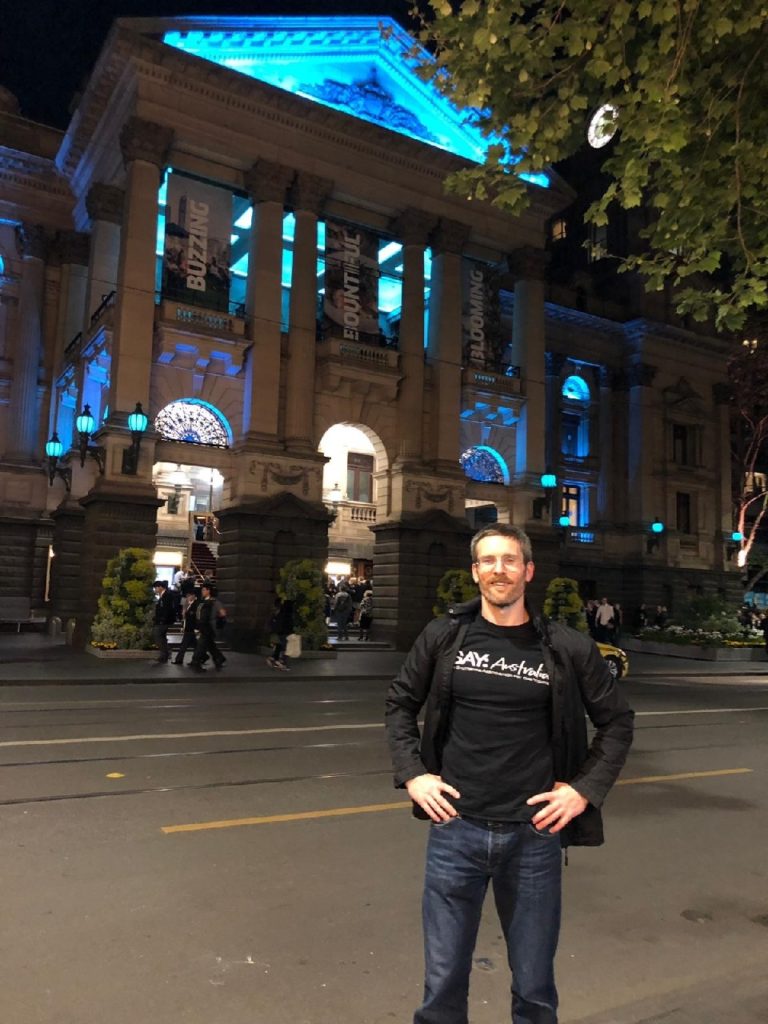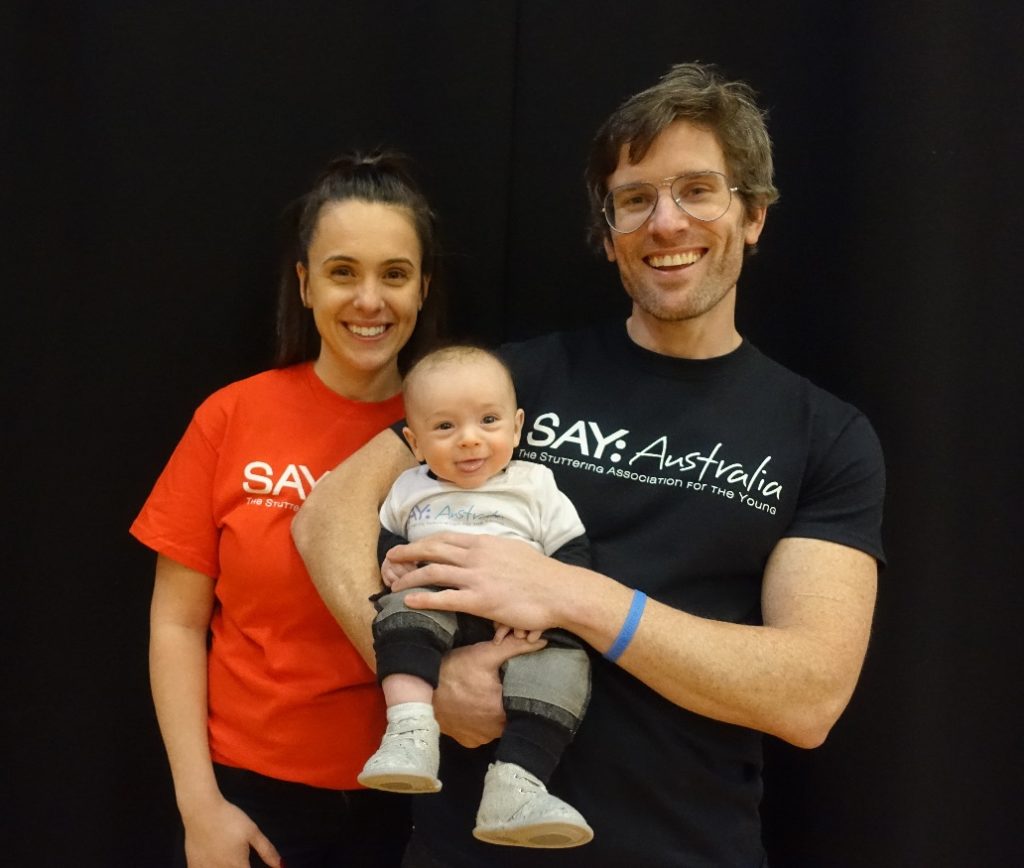Spotlight: Participant Rich talks about his experiences with stuttering
Rich Stephens talks about his experiences with stuttering, and the power of not feeling alone. He feels strongly that “stuttering should never be a taboo subject”. He believes that “to understand anything you need to start at the beginning. Which is why The Genetics of Stuttering Study is so important for the future generations of people who stutter.”
Rich now dedicates his time to supporting young people who stutter through his not-for-profit organisation, SAY: The Stuttering Association for the Young Australia. Although finally at peace with being a person who stutters, Rich’s journey to get there was not straightforward.
Rich hopes that by sharing his story, and through his work at SAY: Australia, he will help other people who stutter to know that their voice matters and deserves to be heard.
“I now know that there are literally millions of people like me who stutter… This provides a level of comfort that as a child and young adult I never had.“
Here’s Rich’s story:
Rich learned from his parents that he started stuttering when he was 4 years old. Rich was a social and engaging child, but when he started to notice that he talked differently to his peers, he became withdrawn.
“I remember, I must have been about 5 years old, trying to say my name to my new teacher…and the words would just not come out. No matter how hard I tried, I couldn’t get the ‘R’ out! It felt stuck in my mouth, and I remember feeling scared. I had no idea what was happening…at 5 years old, how could I!”
“As time went on, my stutter became much stronger. I would stutter on almost every other word. I tried to force the word out by banging my fist on my leg, jerking my head forward, and even pulling on my tongue. I saw a therapist when I was 7 years old, who was really kind. We must have worked on some fluency techniques, yet all I remember is playing with Lego in her office and her having long conversations with my parents.”

“I started to take some flack at school from the older kids, and some teachers would simply ignore me when I raised my hand to answer in class… the name calling was difficult to take, but what hurt most was feeling invisible and cast off in my own world.”
Rich recalls not attending therapy for some time. His father organised for him to start again when he was 10 years old. He dreaded having to talk about his stutter with someone new. Little did he know, this new therapist would open up a new world for Rich.
“I remember our first meeting to this day. I walk into this new office and there’s this guy, about 40 years old, wearing jeans, an un-tucked causal shirt, and curly, scraggly hair… he stands up, offers this warm smile and his hand, and says ‘Hi, I’m P-P-P-P-Patrick’. My jar literally dropped open…this was the first time in my life that I had met another person who stuttered. No other kids in my school stuttered, no one on my street, no one! And in that one moment, my life changed. I knew I was no longer alone as a person who stuttered!”
Rich’s therapist focused more on the inner, psychological and psychosocial aspects of stuttering. And even though Rich’s stutter was still strong, he started to become less anxious, and more accepting of his stutter.
When Rich’s therapy was cut short at the age of 14, he felt as though a rug had been pulled from under his feet. He said. “I started to lose most of the confidence I had gained. I reverted back to avoiding words, avoiding speaking…avoidance became my shadow once more.”
Rich’s stutter became less strong during adulthood, yet he continued to be what is referred to as a covert stutterer.
“I was like a secret agent, I could hide my stutter from almost anyone, and when I did, it felt like a huge win for that moment, that day…but I knew deep down I was doing more long-term harm. The mental effort it took was exhausting. By the end of most days I was truly spent.”
Rich went on to become a mental health nurse, following his true passion of wanting to help others. He worked predominately with young people in the UK, Ireland, and New Zealand. Yet, his true calling would be found in another continent altogether.
“I loved my time working in mental health, but I always dreamed of working with people who stutter. I still had a corner to turn though, as I was still using avoidance techniques to hide my stutter. I returned to Manchester, UK, from New Zealand and attended an adult stuttering support group. For the first time since I was 14 years old I was with other people who stutter.”
Rich found the courage to accept his stutter by sharing life-stories with others who stutter, He made strong friendships and found solace in these relationships. He even went on to study Speech Pathology.
“Four years after finding the support group I became a speech pathologist. During my time back as a student, I travelled to several ASHA conferences and also volunteered at Camp SAY, a camp for young people who stutter in America.”
“In those four years I must have met over a thousand people who stutter, and some have become my closest friends.”
It is through finding this global stuttering community that Rich is now at peace with his stutter. Rich, a dedicated partner and father, relocated to Melbourne, from Manchester (UK), in 2018 to continue his vision, and establish SAY: Australia.

“Does my stutter still get me down at times? Of course it does, but I no longer try to hide it, I no longer revert back to my cave of isolation. If I stutter, well, that’s okay. Being able to talk about it with so many people has helped me accept my stutter. And, sometimes I don’t need to talk about it…I now know that there are literally millions of people like me who stutter. I know that I can call on many of them at anytime. This provides a level of comfort that as a child and young adult I never had.”
“Stuttering should never be a taboo subject in any shape or form, especially in the field of research. I’ve been fortunate to attend many stuttering conferences around the world. I’ve witnessed our level of understanding continuing to increase over the past 30 years. This gives me so much hope about cracking the mysteries of stuttering. I believe that to understand anything, you need to start at the beginning. Which is why the Genetics of Stuttering Study is so important for the future generations of people who stutter. ”
